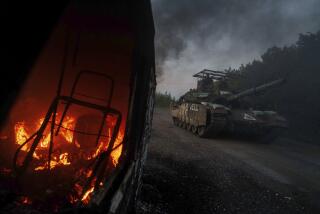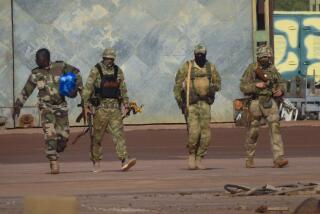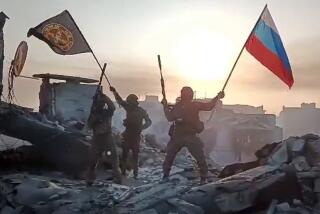Abuse Seen in ‘Sweeps’ of Chechens
- Share via
MOSCOW — Russia has escalated its “sweep” operations against Chechnya’s civilian population, prompting a new flood of refugees from the war zone and fresh reports of human rights violations, officials and rights groups said Friday.
Russian Interior Minister Boris Gryzlov acknowledged that the large-scale operations are underway in towns and villages across Chechnya, describing them as “tough but necessary special operations.”
Since Russia reoccupied the breakaway republic of Chechnya last year, its major tactic against the guerrillas has been the sweeps--known as zachistka operations--of Chechen civilians on the pretext of checking identity documents. Russians say they conduct such document checks to weed out rebels who may be hiding among civilians.
Human rights workers in the Russian republic of Ingushetia, which borders Chechnya, say that in recent weeks the operations have expanded, with several hundred men being held captive at a time and kept in open fields for days. Many detainees report severe beatings and even torture.
“They put up a tent in which they tortured people with electric shocks,” said Liza Musayeva, director of the Ingush office of Memorial, a Russian human rights group. “They were also beating people up outdoors, right under the sun. We have spoken to people whose bodies bear knife and bayonet cuts. One person even had a cross carved on his back.”
A pattern has emerged in which a number of men go missing in the course of a zachistka. Rights groups say that many of those who “disappear” are summarily executed and that the aim of the operations appears to be collective punishment. Both would constitute war crimes.
“The level of arbitrary detentions we are seeing now is unprecedented,” said Elizabeth Andersen, executive director of the Europe and Central Asia division of Human Rights Watch. “This amounts to collective punishment and is absolutely unacceptable.”
Chechnya’s pro-Kremlin prime minister, Stanislav Ilyasov, threatened to resign Thursday in response to what he called the “serious offenses.”
“Such tactics will never promote a return to peace and the resettlement of refugees,” Ilyasov told reporters. “I will no longer occupy this post if I am unable to influence the situation. I will not let anyone turn me into a laughingstock.”
In Moscow, Russian officials denied that violations are taking place in Chechnya.
“These operations must be conducted and are conducted in accordance with the legal norms established for anti-terrorist operations,” Gryzlov said, according to Russia’s Interfax news agency.
The Federal Security Service, the main successor to the Soviet-era KGB, took over command of the Chechen operation in January, in part to address reports of human rights violations. FSB chief Nikolai P. Patrushev chaired a war strategy meeting Friday that addressed the alleged abuses, according to Russian news reports.
“Bandits change into Russian servicemen’s uniforms and perpetrate crimes,” Patrushev said afterward. “A whole range of our [police and military] agencies have obtained documented proof of that. I think that we should take this fact into account and use it.”
Official Russian reports and human rights groups agree on the dates and locations of the major operations.
This week, zachistka operations began in two Chechen villages formerly declared “safe zones” where refugees afraid to return to homes in the republic’s interior had been assured they would be safe. Instead, the operations in Sernovodsk and Assinovskaya were so severe that their pro-Moscow mayors resigned Thursday in protest. The deputy mayor of Kurchaloi, where a massive zachistka began June 16, also quit Thursday for the same reason.
The operation in Sernovodsk began Monday in apparent retaliation for a rebel bombing the day before that killed five Russian police. As many as 800 men and boys, ranging in age from 14 to 90, were herded into a field outside town, Memorial’s Musayeva said. In Assinovskaya, where the zachistka began Tuesday, an estimated 300 men were detained.
The two villages, near the Chechen-Ingush border, had hosted a total of 26,000 refugees in new camps, part of an oft-stated Russian policy of persuading refugees to return to Chechnya. All the residents of those camps have departed for Ingushetia, Interfax said.
Memorial reported that, in violation of Russian law, local civilian authorities were prevented from observing the operation; police were disarmed and detained by troops and mayors were locked inside their offices.
In the last 10 days, sweeps also have taken place in Mairtup and Stariye Atagi and parts of the Chechen capital, Grozny, according to Human Rights Watch.
“It was a horrible zachistka, worse than any zachistka I have lived through,” Supyan Mamakayev, a 52-year-old resident of Kurchaloi, said of the sweep launched June 16. “It was the same almost in every house without exception. They would break into the homes and line up all men age 15 and higher against the wall, point guns at the back of their heads and demand money. They would say: We give you 10 minutes to pay up 1,000 or 2,000 or 3,000 rubles [between $33 and $100] or we will take your men away.
“Most families in the village are poor, and 2,000 rubles is an enormously huge sum,” he said. “Some soldiers accepted 1,000 rubles, some didn’t. Instead they took televisions, refrigerators and even carpets off the walls of the houses.”
Military analysts said the escalation reflects Russian generals’ frustration with their inability to end the war, which has cost the lives of at least 3,433 Russian soldiers since it began in September 1999, according to official data.
“Whatever the government has been saying and whatever the military has been saying, the war has clearly not been won,” said Michael Orr, a senior lecturer at Britain’s Conflict Studies Research Center.
For document sweeps to be effective against guerrillas, Orr said, an army needs solid intelligence so that the operations are aimed at specific individuals. Large-scale operations “are shortsighted and will have an adverse effect. . . . They will be seen as heavy-handed persecution of the Chechens.”
In recent months, pro-Moscow regional officials such as Akhmed Malsagov, prime minister of the republic of Ingushetia, have grown critical of Russia’s war-making policies.
“I apologize for making such a comparison, but some people think that in order to get rid of lice it is necessary to set the house on fire,” Malsagov said Friday.
*
Times special correspondent Mayerbek Nunayev in Chechnya and Alexei V. Kuznetsov of The Times’ Moscow Bureau contributed to this report.
More to Read
Sign up for Essential California
The most important California stories and recommendations in your inbox every morning.
You may occasionally receive promotional content from the Los Angeles Times.













